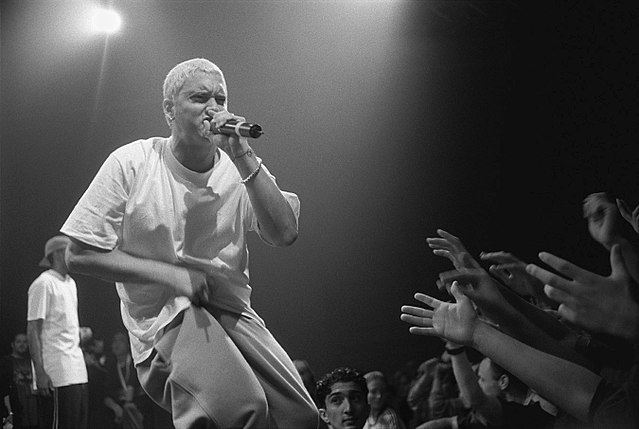The 2002 film “8 Mile,” follows Jimmy Smith, a young white rapper called B-Rabbit. Played by Eminem, Smith is trying to establish a respectable reputation for himself in the Black rap battle community of Detroit.
The film is almost a direct reflection of Eminem’s own origins in hip-hop. Written by Scott Silver and directed by Curtis Hanson, the movie grossed over 242 million dollars against a budget of 41 million. “8 Mile” is often acknowledged as one of the best hip hop movies ever produced.
For the film’s 20th anniversary, Eminem released a deluxe edition of the soundtrack, including instrumental versions of every song on the original album. The soundtrack includes “Lose Yourself,” Eminem’s first number one song on the Billboard Hot 100 chart.
The song went on to win “Best Original Song” at the 2003 Oscars. At the 2004 Grammy Awards, it gained the status of “Best Rap Song” and “Best Male Rap Solo Performance.” The soundtrack features collaborations with 50 Cent, Obie Trice, JAY-Z, Xzibit, Nas and others.
During the rise of the rap genre in the ‘70s, and as it gained popularity throughout the early ‘90s, a rapper’s race illustrated their authenticity. As a genre invented by Black communities, and a critical part of the culture, there was a strict image of who was acknowledged as a rapper.
The image of a Black male was inextricably linked to the role. Once Eminem dropped on the scene, the presence and artistic credibility of white rappers truly began to evolve.
50 Cent, a rapper and actor, has stated that he doesn’t believe Eminem has been given “the credit he deserves” for his impact on hip hop, in regard to boosting the genre’s popularity and accessibility. “I think part of Eminem’s legacy is the growth of our culture,” 50 Cent said. He has called the movie, “a Black story with a White lead.”
“8-Mile” as an artistic production relates to the culture of hip-hop. Race is an important element in the narrative of the story. The term “8-Mile” is a reference to Eight Mile Road in Detroit, a border between the Black neighborhood along Seven Mile Road and the white neighborhood, Nine Mile Road.
This is a physical division, but a metaphorical one as well. This border is referenced by the characters in the film when dissing B-Rabbit, using it to tell him he’s not where he belongs.
Lyckety Splyt (Strike) spits, “You need to take your white ass back across 8 Mile to the trailer park,” in the final rap battle.
Lyckety Splyt also associates B-Rabbit with white artists through the lines, “Take some real advice and form a group with Vanilla Ice,” and, “You’ll get dropped so hard Elvis will start turning in his grave.”
By comparing B-Rabbit to popular white artists, he diminishes B-Rabbit’s legitimacy as a rapper. Actively linking him with white artists that don’t pertain to the rap genre implies that he does not belong. This logic calls B-Rabbit’s credibility into question and implies that he should not be taken seriously.
As the film continues, B-Rabbit starts pointing out his own race and uses this to his advantage. He pokes fun at his own race to demonstrate that not only does it mean nothing to him when others do it, but to prove it has nothing to do with his rapping ability.
He knows he’s got flow. He’s confident in delivering his freestyles. He turns pointing out his race as an indicator of a lack of credibility into a joke that has no credence.
“So I’ma turn around with a great smile; And walk my white ass back across 8 Mile,” B-Rabbit raps. In another line he flat out says, “I am white, I am a f***ing bum.”
In Eminem’s first album, “The Slim Shady LP,” he does more than point out his own race – he mentions countless other disses and misconceptions about himself. There were barely any white rappers at the time of his emergence, so for him to be saying these lines was something completely new.
“I’ve never seen nothing like it. I didn’t even know white people rapped, you know?” Royce Da 5’9 said in the documentary, Hip Hop Evolution.
Race may have been a major defining characteristic of rappers at the time, but so was their socio-economic situation, family background and surrounding environment. The film shows the role these play in the lives and careers of rappers.
In the final rap battle against Papa Doc, he raps, “But I know something about you; You went to Cranbrook, that’s a private school; What’s the matter, dawg, you embarrassed? This guy’s a gangster? His real name’s Clarence. And Clarence lives at home with both parents. And Clarence’s parents have a real good marriage.”
For a white kid to make a name for himself in the rap community of Detroit necessitated unwavering drive. Eminem proved himself, shoving his legitimacy in the faces of those who heard his lyrics.
In “8-Mile” the viewer can observe the role Eminem played in the evolution of rap and hip hop, and how rap and hip hop played a role in the evolution of Eminem himself. The semi-autobiographical account of Eminem’s experience includes obstacles he came across, consistent struggles, and how he began to grow not just as a rapper but as a person. His growth as an artist has been exponential, and so has the prominence of white rappers in the culture of hip hop.
Juliana Yacoubian can be reached at [email protected].


















